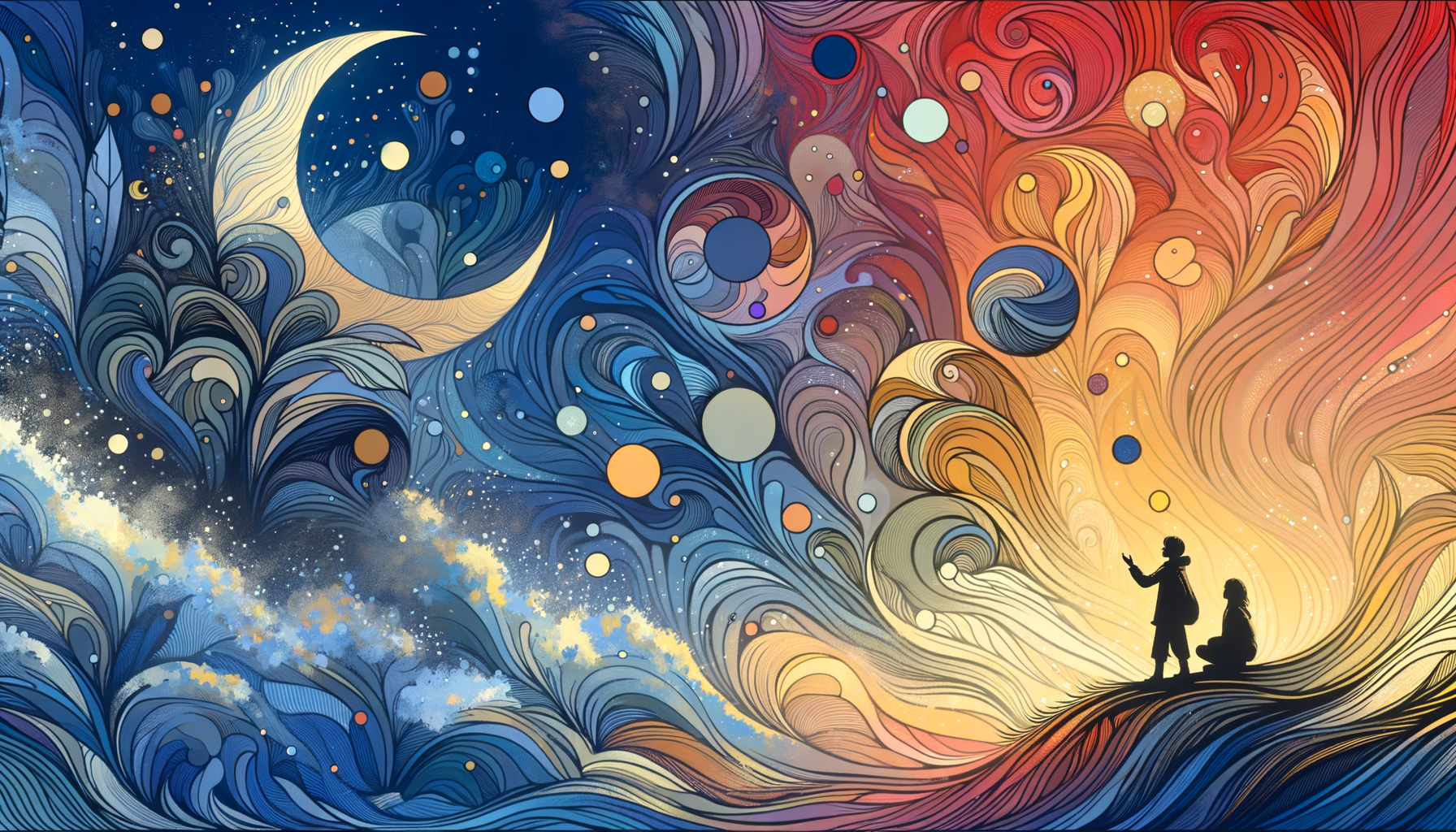The Joy of Being Curious
Let me tell you a story about a picnic that changed the way I approach relationships. Growing up in Boulder, my parents had this tradition called “curiosity picnics.” Once a month, we’d pick a random spot along a hiking trail, unpack a hodgepodge meal, and my dad would bring along something unusual—a weird fruit, a strange object, or a book nobody had read. “Miles,” he’d say, handing me a dragonfruit or a rock he found in the creek, “ask better questions.” And I’d sit there, a scrawny eighth-grader with questionable taste in cargo shorts, wondering what questions to ask. Why is this fruit pink? Where did this rock come from? Can we eat this, or am I going to have the worst stomachache of my life?
I didn’t realize it at the time, but those afternoons shaped the way I move through the world and, eventually, how I approach love and connection. Being curious doesn’t just help you learn trivia about rocks. It draws you closer to people, brings out hidden stories, and uncovers the unexpected layers of even the most familiar human beings. It’s fallen out of style in a world of highlight reels and swipe-left dating rituals. But let me tell you: curiosity is deeply underrated.
What if we popped open the equivalent of a picnic in our relationships—asking better, weirder, more playful questions? Let’s explore how curiosity can change the way we love.
The Lost Art of Asking A Good Question
Imagine this: you’re out on a first date at some dimly lit cocktail bar. It’s going… okay. The drinks are strong, but the conversation is stuck in neutral. You’ve cruised the usual dating small talk questions: “What do you do for work?” “Where’d you grow up?” “Do you eat pineapple on pizza, or is that an unforgivable red flag?”
Now, let me ask you this: when was the last time someone knocked your socks off with a question? I don’t mean some hyper-specific interrogation like, “If you could be any vegetable, what would you be?” (Though, if you must know, I’m a beet — earthy and underappreciated.) No, I mean the kind of question that gets people thinking. Questions that reflect curiosity—about their quirks, their memories, their “why” instead of just their “what.”
One time, I asked someone how they spent Saturdays as a kid. Not their interests or their hobbies or their LinkedIn-worthy achievements—but their unstructured, simplest joys. They lit up. Turns out, they spent summers catching frogs at their grandparents’ place in New Jersey. Frogs led to stories about their adventures as a camp counselor. And that led to us realizing we both low-key still miss the rope swings at summer camp. Suddenly, it felt less like a date and more like we were swapping stories around a campfire.
Better questions create better conversations. Bonus points if you can snag one with a touch of humor, like, “What’s the weirdest or most unnecessary thing you’ve ever Googled?” (Nothing bonds people faster than finding out someone once did a three-hour deep dive on why geese sound mildly insulted at all times.)
Curiosity Is the Opposite of Judgment
There’s something magnetic about people who approach life and relationships with curiosity instead of judgment. You can feel it when you’re with them—they aren’t treating the conversation as a mental checklist of dealbreakers. They aren’t sizing you up like a pair of hiking boots at REI. They’re interested in you, and they leave space for surprise.
Take my friend Jessie, for example. Jessie once dated someone who would only wear black—seriously, head-to-toe monochrome, all day, every day. Jessie could have dismissed this as a quirky affectation (or spent the entire relationship begging them to add a pop of color). Instead, Jessie got curious. “What’s the deal with the all-black wardrobe?” Turns out, it wasn’t a “walking Banksy exhibit” thing. It was tied to how their mom used to sew all their clothes growing up—wildly colorful clothes, I might add—and this was their minimalist rebellion. What seemed like a judgment-worthy oddity ended up being a window into their backstory.
When you’re curious, you’re giving people the benefit of the doubt. You're saying, "Hey, I’m interested in understanding why you are the way you are." It’s disarming, open-hearted—and honestly, a lot more fun than nitpicking someone's Spotify playlist for too many Coldplay songs.
Go Off the Beaten Path
Curiosity also works wonders when dating feels… stale. We’ve all been there. Maybe you’re stuck in a loop of coffee-first-dates or defaulting to dinner at the same three obvious restaurants. That’s fine—a routine is fine—but what if you threw a curveball?
Consider this: instead of asking someone to meet you for drinks, what if you invited them to wander through your favorite farmers market? Or hit up one of those wildly impractical candle-making classes that leaves you both smelling like someone smashed a pine tree into a jar of cinnamon? Or—and this may be my Boulder roots showing—grab two rental bikes and just ride aimlessly to see what you stumble across? (Watch out for potholes. That’s a relationship red flag no one warns you about.)
Why does this matter? Shared experiences, especially unexpected ones, spark curiosity in fresh ways. They shift the focus from “getting it right” to simply enjoying each other’s company. It’s less pressure, more play. It invites you to observe how someone reacts to small surprises—a out-of-tune busker, an over-salted pastry at that farmers market stall, an impromptu wrong turn. And those moments are where connection often blooms.
Last year, I asked someone out to a local wildlife refuge to watch sandhill cranes during their migration season. Yes, I’m aware that’s the nerdiest sentence you’ll read today. But as we stood quietly along the banks of a marsh, watching these impossibly elegant birds gliding across the horizon, we learned something about each other: An appreciation for the small, the wild, the unexpected. It wasn’t about the perfect date; it was about what we noticed together.
Five Takeaways for Cultivating Curiosity in Relationships
-
Start Small, Stay Open: You don’t need grand gestures to spark curiosity. Asking someone about the last thing that made them laugh or the most random skill they picked up in quarantine says more than, “So… what do you do?”
-
Dig Beneath the Obvious: When someone shares something, ask a follow-up question. If they mention they’re into running, ask if they run to playlists or purely to flex on strangers in the park. Those tangents are where the magic is.
-
Bring Fresh Eyes: Even in long-term relationships, try to notice something new about your partner. It could be the way they light up when they talk about soup recipes or the books that have quietly migrated to their side of the bookshelf.
-
Create Shared Adventures: Skip the tired date night rotation. Go someplace neither of you has been before—even if it’s just that weird tiny museum in the next town over.
-
Celebrate the Everyday Mysteries: Wonder aloud about the unfamiliar, even in the mundane. “How is this gas station convenience store selling sushi?” or “Why does this dog park smell this bad?” Moments of curiosity, even silly ones, remind us to laugh together.
Curiosity Keeps Love Interesting
Here’s the thing: being curious isn’t just a fun personality quirk. It’s what keeps our interactions human. It allows us to ask better questions, to laugh at the absurd, and to notice the details that bring people to life. Whether you’re in a new fling or decades into a relationship, curiosity turns day-to-day moments into something meaningful. It reminds us to look twice, dive deeper, and make space for serendipity.
So, the next time you’re sitting across from someone you’re interested in—or even someone you’ve loved for years—channel that picnic energy. Ask better questions. Wonder out loud. And when in doubt, go find a dragonfruit and see what it inspires. Who knows? It might just change everything.




















